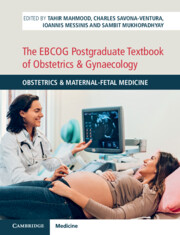Book contents
- The EBCOG Postgraduate Textbook of Obstetrics & Gynaecology
- The EBCOG Postgraduate Textbook of Obstetrics & Gynaecology
- Copyright page
- Dedication
- Contents
- Contributors
- Preface
- Section 1 Basic Sciences in Obstetrics
- Section 2 Early Pregnancy Problems
- Section 3 Fetal Medicine
- Section 4 Maternal Medicine
- Section 5 Intrapartum Care
- Section 6 Neonatal Problems
- Section 7 Placenta
- Section 8 Public Health Issues in Obstetrics
- Chapter 65 Social and Cultural Aspects Affecting Pregnancy Outcomes in Migrant Populations
- Chapter 66 Immunization in Pregnancy
- Chapter 67 Saving Lives, Improving Mothers’ Care
- Chapter 68 Clinical Governance in Obstetric Practice
- Chapter 69 Ethical Issues and Conflict in Maternal-Fetal Medicine and Obstetrics
- Chapter 70 Legal Considerations in Obstetric Practice
- Chapter 71 Research and Audit in Obstetric Practice
- Section 9 Co-Morbidities during Pregnancy
- Index
- Plate Section (PDF Only)
- References
Chapter 69 - Ethical Issues and Conflict in Maternal-Fetal Medicine and Obstetrics
from Section 8 - Public Health Issues in Obstetrics
Published online by Cambridge University Press: 20 November 2021
- The EBCOG Postgraduate Textbook of Obstetrics & Gynaecology
- The EBCOG Postgraduate Textbook of Obstetrics & Gynaecology
- Copyright page
- Dedication
- Contents
- Contributors
- Preface
- Section 1 Basic Sciences in Obstetrics
- Section 2 Early Pregnancy Problems
- Section 3 Fetal Medicine
- Section 4 Maternal Medicine
- Section 5 Intrapartum Care
- Section 6 Neonatal Problems
- Section 7 Placenta
- Section 8 Public Health Issues in Obstetrics
- Chapter 65 Social and Cultural Aspects Affecting Pregnancy Outcomes in Migrant Populations
- Chapter 66 Immunization in Pregnancy
- Chapter 67 Saving Lives, Improving Mothers’ Care
- Chapter 68 Clinical Governance in Obstetric Practice
- Chapter 69 Ethical Issues and Conflict in Maternal-Fetal Medicine and Obstetrics
- Chapter 70 Legal Considerations in Obstetric Practice
- Chapter 71 Research and Audit in Obstetric Practice
- Section 9 Co-Morbidities during Pregnancy
- Index
- Plate Section (PDF Only)
- References
Summary
George E. Moore, one of the founders of the analytic tradition in philosophy, defines ethics as what we ought and ought not to do. It is a deliberation and although feelings such as empathy come into most decision, ethics is not only a feeling but has to be supported by reason. In fact, saying that ethics is only a feeling or an intuition, not needing any reason, has to be supported by argument itself, annulling the very assertion.
- Type
- Chapter
- Information
- The EBCOG Postgraduate Textbook of Obstetrics & GynaecologyObstetrics & Maternal-Fetal Medicine, pp. 562 - 568Publisher: Cambridge University PressPrint publication year: 2021



